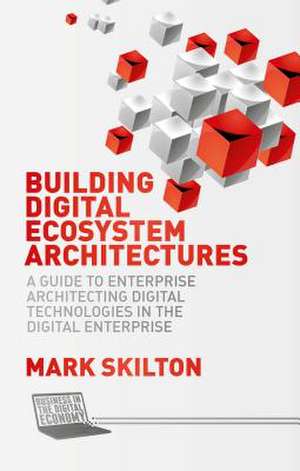Building Digital Ecosystem Architectures: A Guide to Enterprise Architecting Digital Technologies in the Digital Enterprise: Business in the Digital Economy
Autor Mark Skiltonen Limba Engleză Hardback – 16 dec 2015
The key topics covered include:
Concepts of digitization
Types of technological ecosystems
Architecting digital workspaces
Principles of architecture design
Examples architecting digital business models
Examples of digital design patterns
Methods of monetization
Conclusions
Preț: 227.45 lei
Nou
Puncte Express: 341
Preț estimativ în valută:
43.52€ • 45.44$ • 36.02£
43.52€ • 45.44$ • 36.02£
Carte indisponibilă temporar
Doresc să fiu notificat când acest titlu va fi disponibil:
Se trimite...
Preluare comenzi: 021 569.72.76
Specificații
ISBN-13: 9781137554109
ISBN-10: 113755410X
Pagini: 176
Ilustrații: XXXIII, 154 p.
Dimensiuni: 155 x 235 x 20 mm
Greutate: 0.36 kg
Ediția:1st ed. 2015
Editura: Palgrave Macmillan UK
Colecția Palgrave Macmillan
Seria Business in the Digital Economy
Locul publicării:London, United Kingdom
ISBN-10: 113755410X
Pagini: 176
Ilustrații: XXXIII, 154 p.
Dimensiuni: 155 x 235 x 20 mm
Greutate: 0.36 kg
Ediția:1st ed. 2015
Editura: Palgrave Macmillan UK
Colecția Palgrave Macmillan
Seria Business in the Digital Economy
Locul publicării:London, United Kingdom
Cuprins
PART I: ARCHITECTURE IN THE ERA OF DIGITAL ECOSYSTEMS
1. Trends Of Technological Ecosystems
2. Digital Workspace Concepts
PART II: BUILDING EFFECTIVE DIGITAL ENTERPRISE
3. Example Case Studies Of Digital Enterprise Models
PART III: DESIGNING THE DIGITAL ENTERPRISE
4. Design Practices in the Digital Enterprise
1. Trends Of Technological Ecosystems
2. Digital Workspace Concepts
PART II: BUILDING EFFECTIVE DIGITAL ENTERPRISE
3. Example Case Studies Of Digital Enterprise Models
PART III: DESIGNING THE DIGITAL ENTERPRISE
4. Design Practices in the Digital Enterprise
Notă biografică
Mark Skilton is Professor of Practise in Information Systems and Management at Warwick Business School. With over 20 years' experience in information technology in many commercial and public sector businesses, he specializes in helping companies realize their business value, covering social media networks, big data, mobility, M2M Internet of things and Cloud computing. He has worked with some of the top global international companies at board level to realize their vision of digital operating models across their complete technology landscapes. Most recently, Mark is a Digital Leader at PA Consulting and prior to that a Global Director of Strategy at Capgemini. Previously, Mark was European CTO of Services outsourcing and strategic technology consulting solutions at CSC. He has been Head of Digital business analysis at BskyB TV and Media company; lead business re-engineering engagements at KPMG Consulting and worked in transforming the Business and IT of companies in over 25 countries worldwide. Since 2010 Mark has held International standards body roles in The Open Group, where he was co-chair of Cloud Computing and leading Open Platform 3.0 initiatives and standards publications. Mark is active in the ISO JC38 distributed architecture standards and in the "Hubs-of-all-things" a multi-disciplinary project funded by the Research Council's UK Digital Economy Programme. Mark is also active in Cyber security forums at Warwick University, Ovum Security Summits and INFOSEC. He has spoken at the EU Commission on Digital Ecosystems Agenda and is an EU competition Judge on Smart Outsourcing Innovation. Mark has an MBA as well as a Post Graduate qualification in Production Engineering and Design Management from Cambridge University and a first degree in applied engineering science subjects from University of Sheffield.
?
?
Textul de pe ultima copertă
The design of digital solutions has become a pressing concern for practitioners faced with a plethora of technology impacting their business. From cloud computing to social networks, mobile computing and big data, to the emerging of Internet of things, all of which are changing how enterprise products, services, rooms and buildings are connected to the wider ecosystem of networks and services. This book defines digital ecosystems with examples from real industry cases and explores how enterprise architecture is evolving to enable physical and virtual, social, and material object collaboration and experience.
The key topics covered include:
Concepts of digitization
Types of technological ecosystems
Architecting digital workspaces
Principles of architecture design
Examples architecting digital business models
Examples of digital design patterns
Methods of monetization
Conclusions
The key topics covered include:
Concepts of digitization
Types of technological ecosystems
Architecting digital workspaces
Principles of architecture design
Examples architecting digital business models
Examples of digital design patterns
Methods of monetization
Conclusions
Caracteristici
A blend of practical commercial reality and solid academic rigour Author's standing in the field



